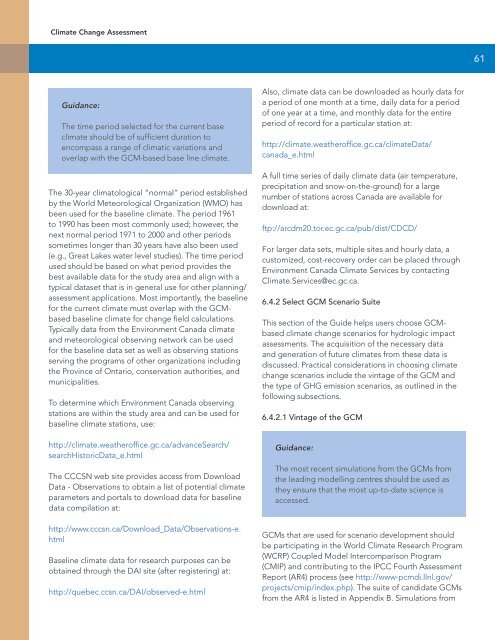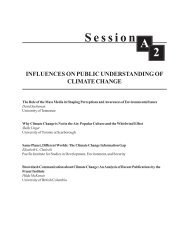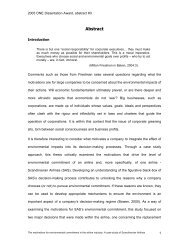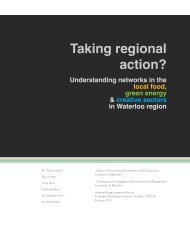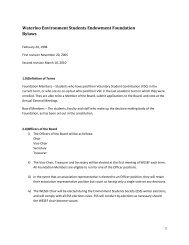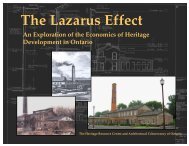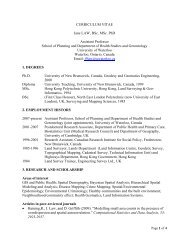ClimateChange Assessment Guide.pdf - University of Waterloo
ClimateChange Assessment Guide.pdf - University of Waterloo
ClimateChange Assessment Guide.pdf - University of Waterloo
Create successful ePaper yourself
Turn your PDF publications into a flip-book with our unique Google optimized e-Paper software.
Climate Change <strong>Assessment</strong>61Guidance:The time period selected for the current baseclimate should be <strong>of</strong> sufficient duration toencompass a range <strong>of</strong> climatic variations andoverlap with the GCM-based base line climate.The 30-year climatological “normal” period establishedby the World Meteorological Organization (WMO) hasbeen used for the baseline climate. The period 1961to 1990 has been most commonly used; however, thenext normal period 1971 to 2000 and other periodssometimes longer than 30 years have also been used(e.g., Great Lakes water level studies). The time periodused should be based on what period provides thebest available data for the study area and align with atypical dataset that is in general use for other planning/assessment applications. Most importantly, the baselinefor the current climate must overlap with the GCMbasedbaseline climate for change field calculations.Typically data from the Environment Canada climateand meteorological observing network can be usedfor the baseline data set as well as observing stationsserving the programs <strong>of</strong> other organizations includingthe Province <strong>of</strong> Ontario, conservation authorities, andmunicipalities.To determine which Environment Canada observingstations are within the study area and can be used forbaseline climate stations, use:http://climate.weather<strong>of</strong>fice.gc.ca/advanceSearch/searchHistoricData_e.htmlThe CCCSN web site provides access from DownloadData - Observations to obtain a list <strong>of</strong> potential climateparameters and portals to download data for baselinedata compilation at:http://www.cccsn.ca/Download_Data/Observations-e.htmlBaseline climate data for research purposes can beobtained through the DAI site (after registering) at:http://quebec.ccsn.ca/DAI/observed-e.htmlAlso, climate data can be downloaded as hourly data fora period <strong>of</strong> one month at a time, daily data for a period<strong>of</strong> one year at a time, and monthly data for the entireperiod <strong>of</strong> record for a particular station at:http://climate.weather<strong>of</strong>fice.gc.ca/climateData/canada_e.htmlA full time series <strong>of</strong> daily climate data (air temperature,precipitation and snow-on-the-ground) for a largenumber <strong>of</strong> stations across Canada are available fordownload at:ftp://arcdm20.tor.ec.gc.ca/pub/dist/CDCD/For larger data sets, multiple sites and hourly data, acustomized, cost-recovery order can be placed throughEnvironment Canada Climate Services by contactingClimate.Services@ec.gc.ca.6.4.2 Select GCM Scenario SuiteThis section <strong>of</strong> the <strong>Guide</strong> helps users choose GCMbasedclimate change scenarios for hydrologic impactassessments. The acquisition <strong>of</strong> the necessary dataand generation <strong>of</strong> future climates from these data isdiscussed. Practical considerations in choosing climatechange scenarios include the vintage <strong>of</strong> the GCM andthe type <strong>of</strong> GHG emission scenarios, as outlined in thefollowing subsections.6.4.2.1 Vintage <strong>of</strong> the GCMGuidance:The most recent simulations from the GCMs fromthe leading modelling centres should be used asthey ensure that the most up-to-date science isaccessed.GCMs that are used for scenario development shouldbe participating in the World Climate Research Program(WCRP) Coupled Model Intercomparison Program(CMIP) and contributing to the IPCC Fourth <strong>Assessment</strong>Report (AR4) process (see http://www-pcmdi.llnl.gov/projects/cmip/index.php). The suite <strong>of</strong> candidate GCMsfrom the AR4 is listed in Appendix B. Simulations from


